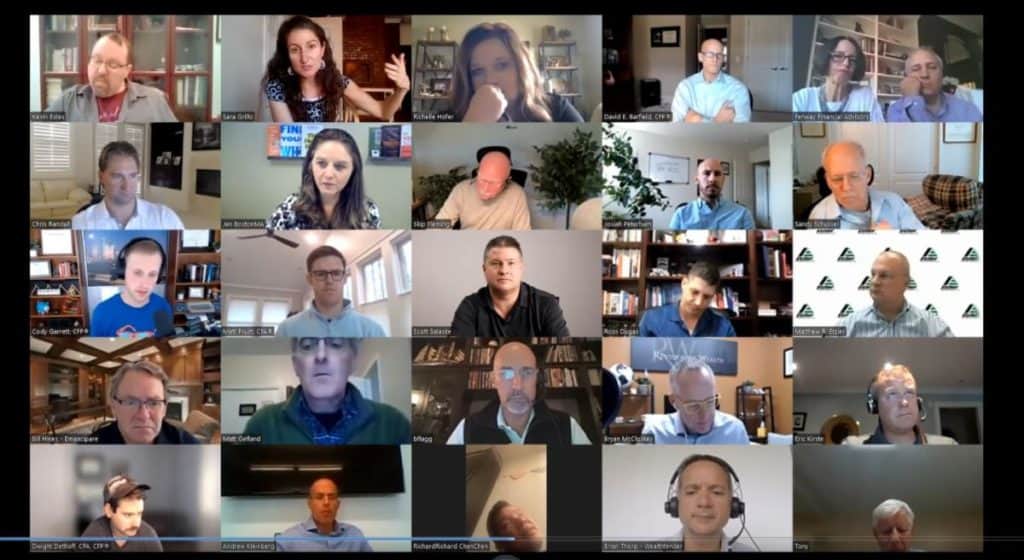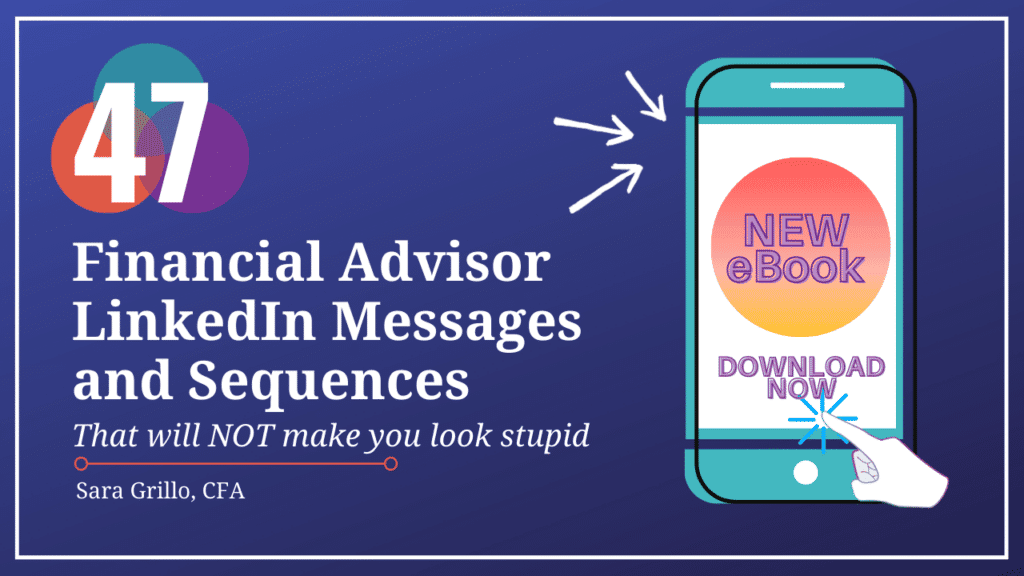Podcast: Play in new window | Download
The IRMAA, or Medicare income-related monthly adjustment amount, is a bit of a missed opportunity for many financial advisors. We’ve got special guests Dan McGrath and Paul Morrison with us today to talk about what you may be overlooking about IRMAA planning.
For those of you who are new to my blog, my name is Sara. I am a CFA® charterholder and financial advisor marketing consultant. I have a newsletter in which I talk about financial advisor lead generation topics which is best described as “fun and irreverent.”

The “old way” – does it neglect IRMAA planning?
Typically the way financial advice has been done in the past is this. The advisor collects the highest possible AUM fee, throws the assets into a TAMP, and then goes to play golf.
It’s time for a revamp.
Although Gen Xers are getting older, the majority of people using a financial advisor are retired or pre-retirees. Retirement for those people isn’t about capturing the highest rate of return – you’ve already won the race hopefully by that point – it’s about making that money survive because you are no longer working.
If you allow your clients to distribute their income incorrectly, they government is going to take all of it.
Not just a little bit.
All of it.
The government is changing the rules
Here are the rules that you should know because the government is changing them.
#1 Your social security benefit is taxable
They look at your adjusted gross income and add it to half of your social security benefit. Given that financial advisors are always encouraging their clients to stash away money in tax deferred vehicles, making those distributions taxable upon withdrawal.
#2 In order to collect social security, you need health insurance
That is the first thing social security looks at when you apply for your benefit. If you don’t have qualified health insurance, you can’t collect your social security check. You must enroll in Medicare or you will get hit with penalties or forfeit your social security benefit.
#3 Medicare premiums are based upon the amount of income you generate.
They are means-tested. This was passed years ago.
#4 What is income for IRMAA?
It happens to be modified adjusted gross income, which is your adjusted gross income, which includes your taxable social security benefit and any tax-exempt interest you have. So the financial industry is setting people up to put money in a traditional 401k and then telling them to maximize their social security benefit which is probably one of the worst things you tell someone.
Because you are essentially maximizing social security benefit, the government is taking half of it, adding it to the distribution from your 401k, 85% of it is being taxed, which now gets added back to that withdrawal. What happens to your Medicare premium? It goes up.
#5 How many people think social security is really going broke?
How do you pay for your Medicare premiums? Through your social security check.
Tax questions we should ponder more deeply
Advisors are working on a way that is outdated when it comes to IRMAA planning. An example is how tax planning is handled. The financial industry is geared towards helping people save as much in taxes today as humanly possible. But are taxes going up or down in the future?
In 2026 the tax breaks we got from Trump in 2017 are sunsetting. Taxes are definitely going up, but you have the financial industry convincing people not to pay taxes today when they are at all time record lows. Wait until later when you get older and they get higher!
Financial advisors say that you’ll be in a lower tax bracket when you retire. Are you really?
Keep in mind you’re receiving your social security benefit which is taxable when you retire.
Let’s say you have $700k in an IRA or 401k when you retire because you were making $125,000 a year and stashing away a lot in savings.
When you retire, you’re going to want to preserve that style of living. How much income are you going to need to live? Financial advisors tell people they’ll be spending less in retirement. However, those decade long habits can be hard to break. You’re going to pulling money from taxable sources. Are you really in a lower tax bracket?
IRMAA is only getting worse
There is a ridiculous idea that the Federal government is going to get rid of IRMAA because it hurts financial advisors. But if you really think about it, without IRMAA, Medicare and social security go insolvent.
Which politician is going to stand in front of the voting public and state that they are going to do that in order to save some advisor at Edward Jones so he can get on his yacht?
On the contrary, IRMAA is only going to get bigger and worse. It’s not going away.
As soon as your clients start earning money, you should be helping your clients plan for IRMAA.
How do you help your clients plan for IRMAA?
Dan believes the solution is getting visible taxable income down, possibly to zero.
Buy life insurance or annuities
Roth conversions, etc.
Most financial advisors already know this. But here’s what they are missing.
The problem is that the normal financial planning tools, and you know what those software packages are, do not do IRMAA planning right.
Dan McGrath thinks these reports are a fiduciary breach.
Yikes!
How so?
Do these softwares show your social security benefit being taxed?
Does it show Medicare premiums coming out of social security?
No.
Dan thinks this is left out because it doesn’t give the client “good feelings.”
So it’s up to you. Can you revamp the way you are modeling IRMAA using Excel, or perhaps does your software include options for modifying these variables? Think about it!
Sara’s upshot
IRMAA planning needs improvement or else there is alot of money that will be flowing away from retirees. Financial advisors should devote time and energy to IRMAA planning to help their clients retire effectively.
Join the Transparency Advisor Movement.

The Transparent Advisor Movement’s mission is to promote ideals of clarity, modesty, integrity, dignity, and client advocacy in all aspects of financial advice, with a special focus on Advice Only, Flat Fee, and Hourly service models. There is a special emphasis on clear disclosure of services and their related fees.
The Transparency Movement is the future of the industry – we welcome anyone who believes in our values to join us.
Join our next Transparent Advisor virtual meetup.

These meetups are free and the goal is to learn from each other about how to grow and manage a transparent practice for the benefit of clients.
Even if you can not make the meetup, or even attend in its entirety, please register for the replay and to be notified of the next one.
For marketing tips in the transparency age…
Learn what to say to prospects on social media messenger apps without sounding like a washing machine salesperson. This e-book contains 47 financial advisor LinkedIn messages, sequences, and scripts, and they are all two sentences or less.

You could also consider this LinkedIn training program which teaches financial advisors how to get new clients and leads from LinkedIn.

Thanks for reading. I hope you’ll at least join my weekly newsletter about financial advisor lead generation.
See you in the next one!
-Sara G
Disclosures
Grillo Investment Management, LLC does not guarantee any specific level of performance, the success of any strategy that Grillo Investment Management, LLC may use, or the success of any program. Nothing in these materials may be construed as an investment, insurance, or financial recommendation. For such a recommendation, consult with a financial advisor.
Grillo Investment Management, LLC will strive to maintain current information however it may become out of date. Grillo Investment Management, LLC is under no obligation to advise users of subsequent changes to statements or information contained herein. This information is general in nature; for specific advice applicable to your current situation please contact a consultant or advisor. Opinions stated by third parties may not be correct and do not reflect the views of Grillo Investment Management, LLC. Grillo Investment Management, LLC may not be held accountable for any statements made by third parties.







